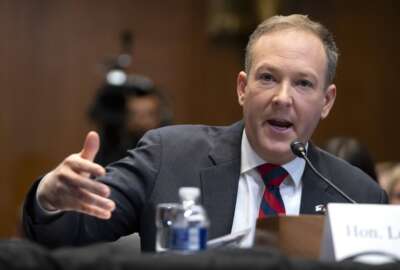Lawmakers, OPM seek facelift for aging GS system
There's growing consensus on Capitol Hill and from the Obama administration that the pay and personnel system used by the federal government since 1949 and...
There’s growing consensus on Capitol Hill and from the Obama administration that the pay and personnel system used by the federal government since 1949 and infrequently updated is showing its age — and due for a major facelift.
Lawmakers probed the General Schedule system Tuesday during a hearing before the House Oversight and Government Reform Subcommittee on the federal workforce, U.S. Postal Service and the Census.
“It’s hard to see the fairness in the current system and bureaucratic culture that it fosters,” said Rep. Blake Farenthold, chairman of the panel. “It allows workers to simply show up for work and stick around for years and get wages … No private-sector could survive if it’s HR system was run this way. Even federal employees themselves recognize the flaws in the current system.”
OPM Director Katherine Archuleta, who testified before the committee, said the administration is on board with the calls for change.
“We really need to take a look at the whole system,” she said. “I think it is time after 65 years to begin to look at all parts of civil-service reform, with input from the Congress, from the president and his administration, and from labor and experts in the field. I think it is time to step back and take a look at that.”
The White House’s fiscal 2015 budget proposal called the current system “inflexible and outdated,” and President Obama is calling for the establishment of a commission on GS reform, Archuleta said.
“In the meantime, we need to enforce and to support the system that we have right now,” Archuleta said. “And that is OPM’s job to make sure that managers are held responsible, employees understand their responsibilities and that there are performance-management tools available to both, so that they can perform to the level that the American people expect.”
GAO: Piecemeal fixes won’t cut it
The government has made tweaks over the years at the edges of the GS system, but the government needs to a take a more holistic approach to enact true reform, said Robert Goldenkoff, director of strategic issues at the Government Accountability Office.
“One of the problems is that, in the past, we’ve tried to address it piecemeal — looking at the pay system, looking at the classification system, looking at the performance-management system,” Goldenkoff said. “The thing is, it’s all interrelated. It has to be treated as a matrix, as a system, and we’re just not doing that.”
GAO released the preliminary results of its study into the General Schedule, finding the job-classification system falls short of several key attributes for a “modern, effective” system.
On the whole, the system is outdated. When the GS was developed in 1949, more than 75 percent of federal employees were clerical workers at GS-7 or below. That number is now only 17 percent. Between 1998 and 2014, the number of GS-12 through GS-15 employees increased by 30 percent. More workers being squeezed into fewer and higher grade levels elides differences in performance and could makes it more difficult for managers to make meaningful distinctions.
“We’re trying to accomplish the federal government’s mission by essentially driving a Studebaker when we need smart cars,” Goldenkoff said.
But while there’s agreement that the GS system needs an overhaul, consensus was harder to come by on the ways an updated personnel system could be used to help the government recognize exemplary employees and handle poor performers.
Is GS system ‘de-motivating’ employee performance?
Just 38 percent of employees agreed that performance awards and pay increases in their unit depend on how well employees perform their jobs, according to the most recent version of the Federal Employee Viewpoint Survey. And only 22 percent believe performance and pay are linked.
The performance of a great number of federal employees is rated on a binary, pass- fail system, which Pat Niehaus, the president of the Federal Managers Association, called “de-motivating.”
“If you have an employee who is a stellar employee who still has that passion, who works that extra hour, who goes that extra mile, and the person sitting next to them comes in and does the job they’re paid to do and they do it well, but they just do what they’re paid to do — they don’t go that extra mile — they get exactly the same performance rating,” Niehaus said. “They get the same paycheck.”
Federal employees also feel that many poor performers also aren’t properly dealt with. Just 28 percent of employees said their agency takes steps to deal with poor performers, according to the most recent version of OPM’s survey.
Rep. Darrell Issa (R-Calif.), chairman of the full Oversight Committee, said he believes there may be too many workplace protections for federal employees because of both civil-service protection laws, as well as the robust labor-union grievance processes. That “double layer” of protection may be insulating poor performers from discipline or even termination, he suggested.
But Goldenkoff said that may be an issue of ineffective management that wouldn’t necessarily take legislation to fix.
“There are issues with the process — it can sometimes be cumbersome, there are a lot of protections built into it to protect it from things like politicization and arbitrary and capricious management — but in a lot of these cases, if managers would only be managers and do their jobs, a lot of these problems would go away … The problem often is with managers not doing their jobs effectively.”
RELATED STORIES:
Does GS system need an update? Lawmakers ask GAO to review federal pay scale
Updating GS pay system key to attracting new talent
Civil-service reform needs more than ‘Band-Aid approach,’ experts argue
Copyright © 2025 Federal News Network. All rights reserved. This website is not intended for users located within the European Economic Area.





